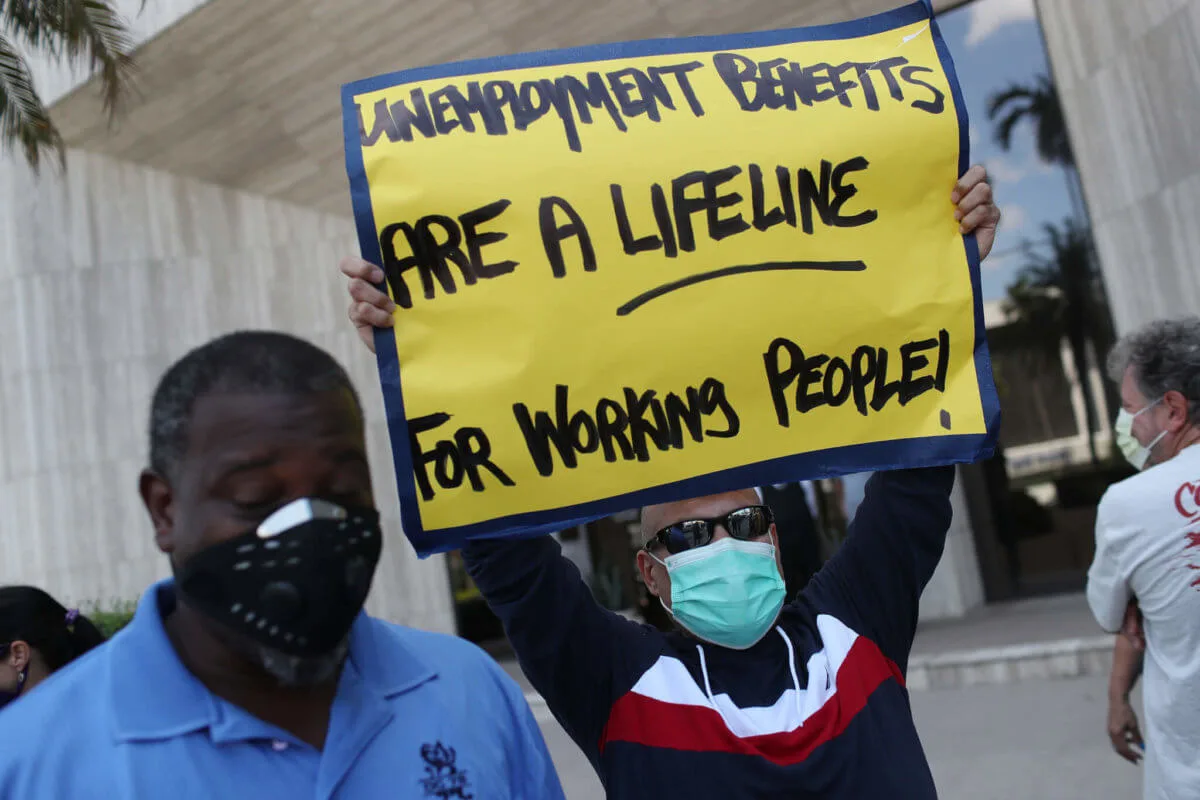
Carlos Ponce joins other demonstrators participating in a protest asking Senators to support the continuation of unemployment benefits on July 16, 2020 in Miami Springs, Florida. The protesters were asking Senators to support the new Schumer/Wyden legislation that extends unemployment benefits for all laid-off Americans as the coronavirus pandemic continues to disrupt the economy. (Photo by Joe Raedle/Getty Images)
Experts say cutting federal pandemic unemployment benefits, as proposed by GOP lawmakers, could hurt Pennsylvania’s economic recovery and would cost the state roughly $2 billion in buying power.
State GOP lawmakers who think Pennsylvanians are not returning to work because they’re getting an extra $300 a week in federal unemployment benefits have introduced legislation to end Pennsylvania’s participation in the program.
Economists, on the other hand, say these actions are dangerously shortsighted and could actually hamper the state’s economic rebound.
Pennsylvania is still short more than 400,000 pre-pandemic jobs and small business revenue is down 25%, according to the Keystone Research Center and PA Budget and Policy Center.
“This relief maintains consumer buying power and sustains our economic recovery,” said Stephen Herzenberg, executive director of the Keystone Research Center. “The current numbers on jobs—and on small business revenues—also suggest we still need additional federal stimulus, including a robust infrastructure package.”
President Joe Biden’s American Rescue Plan included $2 billion for Unemployment Insurance (UI) system modernization, equitable access, and fraud prevention. The American Families Plan proposes to adjust the length and amount of UI benefits received depending on economic conditions. The American Jobs Plan allocates $100 billion in workforce development programs aimed at underserved groups and worker protection.
What Plans Have Republicans Introduced to Cut Off Unemployment Compensation?
State Rep. Jim Cox (R-Berks/Lancaster) has introduced the Back-to-Work Bonus Program.
The legislation would end the federal pandemic unemployment compensation programs, including:
- Federal Pandemic Unemployment Compensation (the extra $300 per week)
- Pandemic Unemployment Assistance program (unemployment benefits for those who are not eligible for traditional state unemployment compensation)
- Pandemic Emergency Unemployment Compensation program (an unemployment benefits extension program)
The legislation also provides a $300 incentive for those who stop filing unemployment and re-enter the workforce. To be eligible for the bonus, you must be a PA resident and have completed four consecutive full weeks of employment.
Individuals can receive another $300 bonus after completing an additional four consecutive full weeks of employment.
The bill is currently in the House Appropriations Committee. It passed the House Labor and Industry Committee last month by a vote of 13-10.
Sen. John Gordner (R-Columbia) has also introduced legislation that would offer an incentive bonus for those who return to the workforce.
In his bill, Gordner proposes creating the Return to Work Grant Program, which would give individuals a $1,000 bonus if they stop filing unemployment and get a job working at least 32 hours per week for four weeks.
The bill is currently in the Senate Labor and Industry Committee.
Why These Republicans Are Wrong
Economic research confirms that the Republican narrative about overly generous unemployment benefits is wrong, Herzenberg said.
When the supplement to weekly benefits was twice as big—$600 per week—under the CARES Act signed by former President Donald Trump, Yale economists found that expanded jobless benefits did not decrease employment or deter people from returning to work when the economy began to pick up.
“There may be areas where some employers are struggling to staff positions, but the likely obstacle is not overly generous UI benefits,” Cooper said. “Instead it is wage offerings that are too low to make these jobs attractive.”
Many of the businesses that are struggling to hire and keep employees are those that pay the minimum wage or less. The minimum wage is $7.25 per hour in Pennsylvania, which adds up to a rate of $15,080 before taxes.
Retailers, which often pay the minimum wage or just above it, had nearly 1 million job openings in April—twice as many as they had the previous year. That’s because retail workers are leaving their jobs at record rates.
Restaurants, which are allowed to pay employees as little as $2.83 per hour in Pennsylvania, are also having trouble staffing up. Restaurants across the country have been adding jobs as pandemic-related restrictions have lifted, but they are still 1.8 million jobs short of what they had before the pandemic, according to the National Restaurant Association. Workers have cited poor wages, difficult working conditions, harassment from patrons, and low tips as reasons they don’t want to return to those jobs.
Meanwhile, businesses that have raised their wages above the state minimum have seen an influx of applicants. Popular Pennsylvania convenience store chains Rutter’s and Sheetz saw an influx of applications after they announced wage increases. And Klavon’s Ice Cream Parlor in Pittsburgh received more than 1,000 applications in the week after the owner raised wages to $15 per hour.
Experts Say Cutting Federal UC Benefits Will Hurt Pennsylvania
The most recent national jobs and unemployment data show that the country has not yet recovered from the COVID-19 recession, said David Cooper, senior economic analyst with the Economic Policy Institute.
As of April, Pennsylvania still had 426,100 fewer jobs than in February 2020( nearly 9% of all the jobs in the state), according to the Keystone Research Center.
Pennsylvania’s unemployment rate in May was 6.9%, as reported by the US Department of Labor and Industry.
“Unemployment Insurance provides a lifeline to workers unable to find suitable jobs, giving them time to find work that matches their skills and pays a decent wage,” Cooper said. “Moreover, the money provided through these entirely federally funded programs bolsters consumer demand and business activity in local economies, helping to speed the recovery.”
As the threat from the pandemic fades and businesses return to regular operations, more people are returning to the workforce, Cooper said. In every state, the volume of weekly unemployment claims filed has fallen significantly from earlier this year.
Cooper said that those still filing for unemployment benefits are the workers who need it the most, due to care responsibilities, health concerns, or other factors. Cutting off the federal pandemic unemployment programs is not in the long-term best interest of Pennsylvania’s workers or businesses, he said.
So far, 25 states have stopped providing the federal supplements to unemployment, forgoing an estimated $22 billion in buying power, according to the Keystone Research Center.
If Pennsylvania did the same, the state would lose roughly $2 billion in buying power.
Actions that scale back buying power the economy needs for a strong recovery hurt not just the workers who lose income but other working families and small businesses, Herzenberg said.
“Cutting unemployment benefits reduces consumer demand and extends joblessness further into the future,” he said.
Support Our Cause
Thank you for taking the time to read our work. Before you go, we hope you'll consider supporting our values-driven journalism, which has always strived to make clear what's really at stake for Pennsylvanians and our future.
Since day one, our goal here at The Keystone has always been to empower people across the commonwealth with fact-based news and information. We believe that when people are armed with knowledge about what's happening in their local, state, and federal governments—including who is working on their behalf and who is actively trying to block efforts aimed at improving the daily lives of Pennsylvania families—they will be inspired to become civically engaged.


For Rep. Susan Wild, supporting PA families includes reproductive rights and much more
Rep. Susan Wild wants to be very clear with Pennsylvanians: Donald Trump is committed to taking away women’s reproductive freedom, but he is not...

School districts working with anti-LGBTQ groups can cost your kids’ schools millions
Parents across South Central Pennsylvania are worried about the potential financial impacts working with anti-LGBTQ groups may have on their school...

VIDEO: Trump distances himself from his anti-abortion views
Donald Trump appeared on WGAL on Tuesday and continued to distance himself from his anti-abortion views claiming that reproductive rights are now a...

VIDEO: Community pushback gets school board to rescind decision on denying gay actor’s visit
Cumberland Valley School Board offered a public apology and voted to reinstate Maulik Pancholy as a guest speaker a week after the board voted to...

VIDEO: Project 2025 brings nuclear armageddon back into vogue
Project 2025 is a titanic document, with plans ranging from cutting half of all government employees to targeting reproductive rights on a scale...




